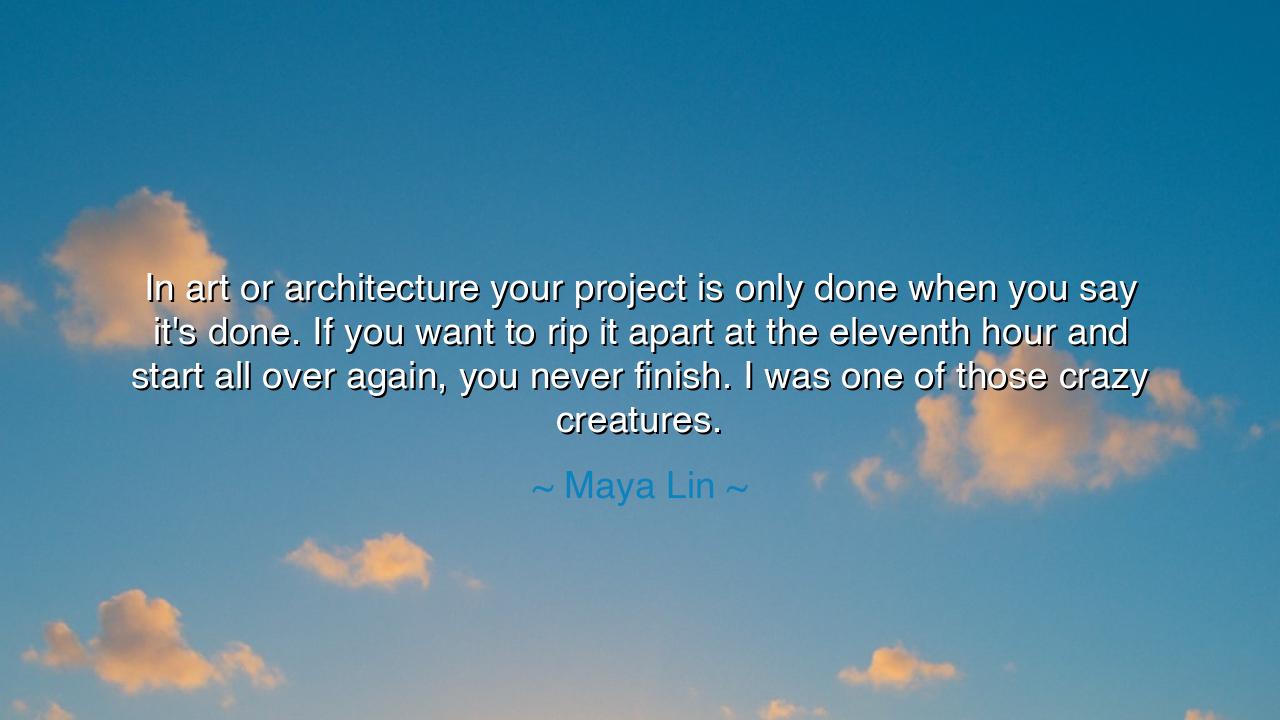
In art or architecture your project is only done when you say
In art or architecture your project is only done when you say it's done. If you want to rip it apart at the eleventh hour and start all over again, you never finish. I was one of those crazy creatures.






Host: The room was bathed in soft light, the evening settling outside as the last rays of the sun faded into dusk. Jeeny sat by the table, her fingers lightly tapping on the edge of a notepad, her thoughts clearly far away. Jack leaned against the window, his arms crossed, his gaze lost in the view below. The quiet between them felt deep, like an idea was slowly forming, waiting to be articulated.
Jack: (his voice reflective) "In art or architecture your project is only done when you say it's done. If you want to rip it apart at the eleventh hour and start all over again, you never finish. I was one of those crazy creatures."
Jeeny: (looking up, her voice gentle, but filled with understanding) "That sounds so familiar. The urge to keep tweaking, adjusting, refining until you feel like it’s perfect — but when does that perfection ever come? It’s like the more you work on something, the more you see the flaws, and the closer you get to something, the more it feels unfinished."
Jack: (nodding slowly, his voice thoughtful) "Yeah, it’s a never-ending process. You think, ‘One more change and it’ll be right,’ but in reality, that change could go on forever. At some point, you have to say it’s enough. You have to let it go, even if it’s not perfect."
Jeeny: (smiling softly, her voice gentle but with a hint of wisdom) "It’s true, isn’t it? The drive for perfection can be paralyzing. If you’re constantly chasing the ‘perfect’ version of something, you’ll never finish. And that’s the trap — the idea that something can always be improved, but in doing so, you never get to the point where you can call it done, where you can step back and say, ‘This is it.’"
Jack: (his expression softening, almost in realization) "It’s like being afraid of failure, but in a different way. You’re afraid of finishing, of saying, ‘I’m done with this,’ because you’re scared it won’t be good enough. But what you don’t realize is that in constantly picking it apart, you miss the opportunity to step back and appreciate what you’ve created."
Jeeny: (nodding, her eyes full of understanding) "Exactly. It’s not about making it perfect. It’s about making it complete. Sometimes, finishing something — letting go of that constant refinement — is the most important part. You have to give yourself permission to say, ‘This is good enough,’ and move on."
Jack: (his voice soft, filled with a sense of calm) "That’s the key, isn’t it? Knowing when to stop. When to embrace the imperfections, the unfinished parts, and still see the value in what you’ve created."
Jeeny: (smiling, her voice reassuring) "Yes, because in the end, perfection doesn’t exist. What we create, whether art or anything else, is valuable for what it is, not for what we think it should be. The process is important, but at some point, we need to let go and let what we’ve created stand as it is."
Host: The room seemed quieter now, filled with the weight of their words. Jack and Jeeny had found something deeper — a truth that resonated not just in the world of art or architecture, but in all aspects of life. Perfection was an illusion, a moving target that could keep you from ever finishing. It was the act of letting go, of accepting what was, that made the creation meaningful. The world outside continued its rhythm, but in the stillness of their conversation, there was a shared understanding: to create was to embrace the beauty of completion, flaws and all.






AAdministratorAdministrator
Welcome, honored guests. Please leave a comment, we will respond soon